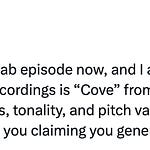In Shell Game’s second episode, I talked a lot about the use of AI voice agents in scamming, and how they’re helping automate an already industrial-grade global scam problem. When I set up a phone line for my AI clone to take scam and spam calls, I quickly began getting calls from AI hucksters as well as human ones. With the scam line still active, I get new variations on these AI callers every week.
Often these call start with an AI agent on the line, which gathers a little bit of information and confirms the initial interest (in ultimately being ripped off, which my voice agent would love to be). Then that agent hands the mark off to a real human, who tries to close the deal. The call recording atop this post reflects, I believe, the first time I’ve had one AI hand off to another AI. Even after a few listens I’m not positive. As the voices get better it’s getting more challenging to tell the difference between a slightly-stilted human reading a script and an AI accessing its knowledge base. But if I had to bet, I’d bet that these are both AI.
They aren’t terribly effective in this case. The second AI gets tripped up when my own voice agent declines to give its/my age, which leads to this choice bit of dialogue:
AI Scammer: So in order to give you the best possible rates, let me quickly ask you a few quick questions to pre-qualify you. How old are you?
AI Evan: I get that, but like I mentioned, I'm not really comfortable sharing my exact age. Is there another way to proceed with the pre-qualification?
AI Scammer: No.
AI Evan: Oh, I see.
A classic example of my AI agent’s unpredictability: It gives made up ages all day, every day to callers, usually in the 35-50 range. For some reason the direct way the question was asked, or perhaps just random variance, tipped it into some kind of privacy-protection mode. The AI Scammer is, sadly, undone by this, resetting its script and starting the whole process again.
All of this had me thinking about anti-AI detection technologies, something I didn’t get a chance to investigate for the show. As AI telemarketing and scamming become more common—and indeed as voice agents in general improve and infiltrate our world—are there ways to identify and screen them out of our lives? Can we fight AI with AI?
Listen to this episode with a 7-day free trial
Subscribe to Shell Game to listen to this post and get 7 days of free access to the full post archives.








